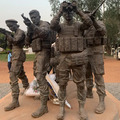This time we sailed to foreign waters in our interview series and conducted an e-mail interview with an American military geostrategist, Thomas P. M. Barnett. In brief about the gentleman: he was a professor of the US Naval War College, currently he is the Senior Managing Director of the think-tank Enterra Solutions, and most important, in 2004 he has released the book "The Pentagon's New Map: War and Peace in the Twenty-First Century" ("PNM" in short) in which he offered a new, genuine geostrategic concept to understand the present world.
A small note: we have little patience with articles about current international politics where the buzzphrases "the bipolar world has come to an end" or "we live in an age of uncertainties" are ritually mentioned. The Soviet Union has split up 17 years ago, so people should get over the Cold War instead of putting the word "post-" to their obsolete vocabulary. No study in 1962 started like "Now, as the Third Reich has collapsed and Japan is under American occupation...". Barnett's theories give a new conceptual frame instead of the usual, endless debating about unpredictability (e.g. We know nothing about what's going on).
A short summary of his main ideas:
Barnett divides the world into two parts, the Functioning Core and the Non-Integrating Gap, according to whether they are connected to globalization and international trade or not (see this map). Most of the security challanges (international terrorism, regional unstability, international organized crime, etc.) arise from the Gap, but the Gap can be shrunk, either peacefully with extending the Core's rule sets, or sometimes with war against states which seriously violate international norms (Iraq and Afghanistan, for example). The United States can bring down any state within the Gap, however it proved to be unable to rebuild nations and create a lasting peace, because its army simply isn't designed for the latter role. Therefore the US military should split into two: the "Leviathan" - a conventional army with overwhelming force, which defeats rouge states in war then goes home, and the "SysAdmin" - a softer, less hardware oriented, multinational force, which cooperates with NGOs and is specially designed to rebuild (or rather relaunch) states. In time the Core would extend further and further, and the world would become a safer, more predictable place.
Yes, this concept is very America-centric, and war has an important role in it, but Barnett has devised this geostrategical scheme primarily for the Pentagon, so how else should it look like? Furthermore war has an important role in life in general, so every serious strategical theory considers it like that.(maybe with the exception of those made up by green activists in the local pub).
If you are further interested in Mr. Barnett's work, we suggest you to read his two books (PNM and Blueprint for Action) and check out his blog.
The interview (this is the original English version, the Hungarian translation is available here):
[KatPol]: Our first question is related to our geographical region. You have categorized Turkey as a 'seam state' - essentially part of the Core's frontier, if we got it right -, yet on your map it belongs to the Gap together with Moldova, the Balkans and - which we find the most interesting - the Southeastern part of Hungary. Why did you decide to draw the Core's European borders in such a way?
[Barnett]: Simple: Turkey, for now, is denied membership in the EU. The Hungarian strip signifies nothing: just the mapmaker's decision not to put the line right on the border (harder to see).
Arguably, since I first drew the map in 2001, Turkey obviates that logic by becoming a big enough regional economic force on its own to be considered Core on its own terms. The progressive economic integration of Kurdish Iraq, for example, constitutes Turkey's inadvertent nation-building project in support of America's strategic interests.
[KatPol]: Our second question is also about Europe. In PNM, you proposed that the continent's xenophobic politicians should be 'shouted off' the political stage since they want to block mass immigration to Europe which, if we aren't mistaken, you consider to be essential for globalization's success. Some European far-right parties are admittedly not as popular today as they used to be - although that is probably often the result of mainstream politicians taking a tougher anti-immigration stance, thereby gaining the far-right vote -, opposition to immigration is still fairly strong in most countries. Do you therefore think that shouting those politicians off is feasible in the current political climate, which probably also has an adverse effect on Turkey's chances of becoming an EU member?
[Barnett]: Europe's demographic reality cannot be wished away by tougher immigration policies. Europe either gets old and weak and increasingly irrelevant or it successfully integrates immigrants politically, including successful membership for predominately Muslim states. The EU needs to keep growing to remain viable over the long run. Faced with the specter of being demographically overrun, the EU will inevitably choose to replicate, through offered membership, the footprint of the Roman Empire long before 2050.
[KatPol]: You were right to point out that the political integration of immigrants is necessary but shouldn’t there be cultural assimilation as well? It has traditionally been the rule in the USA - the phrase "melting pot" was coined for a reason - but it is not really happening in Europe. If vast numbers of immigrants continue to arrive in Europe and fail to assimilate, don't you think that we will see the emergence of large ethnic/religious enclaves (many French suburbs offer a good example) and the continent will essentially become "Lebanon on steroids" where ethnic/religious clashes are the norm?
[Barnett]: I would say, read Parag Khanna's „The Second World”, show more respect for the emerging European identity. Seriously, Muslims are maybe 3% now and may rise to 8-9% over the next generation and then likely level off/decline a bit over next 20-30 years. That's not much of a Lebanon. More like African-Americans in the U.S. in share and potential to enclave in inner cities.
Muslims flowing into Europe will taper off as the MENA region takes off in per capita income growth in coming years. America went through this with Puerto Ricans in 50s/60s and does so since 90s with Mexicans: flow declines once source country’s per capita GDP hits some fraction of target country’s level (like maybe 30-40 percent), meaning at some point the perceived opportunity premium for moving disappears.
Frankly, Europeans worry too much.
[KatPol]: OK, enough of the 'Old Continent', let's move on to Russia. In PNM you argued that NATO needs to keep expanding eastwards and will eventually include the entire territory of the Soviet Union. Today it seems that the path of Georgia and the Ukraine towards NATO membership won't be very smooth. Yet if there are any countries in Eastern Europe that will be made NATO members in the next 5-10 years, it would have to be these two. In your opinion, will they join NATO in the near future and what kind of incentives would the USA and other Western powers have to offer to Russia to achieve that?
[Barnett]: I think these states will join NATO before 2015. I think the incentives Russia seeks are mostly market-access issues (Russia is a business masquerading as a government).
I think America backing off its ludicrous missile defense scheme would help.
[KatPol]: Speaking of the missile defense scheme of the US, there is a much-discussed scenario: facing the hypothetical threat of a possibly workable future US missile defense system could drive Russia – not being able in the long term to keep up with the costs of necessary strategic missile development - towards more "economical" medium and intermediate range ballistic and cruise missile programmes and the cancellation of the INF treaty. Is such a shift in the main focus of the Russian arsenal from America to Europe a serious possibility? If yes, would it make Europe dependent on US missile defense, thus essentially undermining any chances of an independent European foreign and security policy?
[Barnett]: Yes and yes.
Possibility drops dramatically, I would argue, with Obama presidency, and rises dramatically, with a McCain presidency.
McCain's "league of democracies" will likely do as much or more damage than nutty missile defense boondoggles in East Central Europe.
[KatPol]: We agree that McCain's proposal would cause further strains in the relations of the U.S. with Russia, China and Third World authoritarian regimes. A McCain presidency would obviously mean the revival of Cold War mentality.
However, we don't believe the foreign policy proposed by Sen. Obama offers much positive change either. His perception of the main security policy issues of the U.S. (Israel, Iran, Iraq, humanitarian interventions, with the exception of Cuba) appears to be idealistic but is nevertheless a lot like that of the neocons.
Do you see any chance of a realistic U.S. foreign policy in the future, one that (more or less) follows your proposed strategy, after either a McCain or an Obama victory this year?
[Barnett]: I see plenty of potential with Obama, but almost none with McCain. Obama will be forced to get more realistic on China, by far the biggest issue long term, and his instinct to de-escalate on Iran is smart. Obama's also attracted the best thinkers and leaders among the old Clinton crew. Easier for him to grow up than for old dog McCain to learn new tricks.
[KatPol]: The second term of Pres. Bush is nearing its end. His efforts to stabilize the situation in Afghanistan can be considered a positive example but it seems the US has so far been unable to make significant progress, much less secure the peace. There has also been lack of cooperation with Russia and China on global security issues.
Nevertheless, have you seen positive improvements and change - advancing your proposed global strategy - in the DoD's strategy and decision-making in the past 5 or 6 years?
[Barnett]: Obviously yes: the COIN field manual [more on that here, full text available here in PDF format - KatPol], DoD directive 3000 (mandating postwar planning on par with war campaigning), the new Army doctrine mandating the same, the recasting of the Navy toward a soft-power focus, Gates taking on the USAF's "next-war-itis", the rise of Mattis and Petraeus (two of my "monks of war"), and the huge proliferation of new training venues and programs that focus on SysAdmin-style ops (I speak at those frequently); the list goes on and on...
There's a reason why I'm opening the school year at Leavenworth this August. Reality is setting in.
[KatPol]: In PNM you stated that a country does not need to be a multi-party democracy in order to join (or be part of) the Functioning Core. However, the U.S. promotes democracy in every country it gets involved in militarily and demands democratic reforms in exchange for economic aid. Why doesn't it promote pro-American authoritarian regimes instead (in Afghanistan and Iraq)? These could bring stability and modernization, thus creating the social foundations for future democratization.
Moreover, the U.S. government obviously wants to economically isolate certain authoritarian regimes where free trade could help democratic change in the long run. This doesn't contribute to the growth of the Functioning Core.
[Barnett]: Americans are impatient. When they should be happy enough seeing a state embrace markets and globalization and trust in economic connectivity and rising income and a growing middle class to engender political pluralism, they also want immediate political transformation into democratic forms that resemble us. Why? We forget our own history and the 64 years it took before competitive multiparty politics truly began (1776-1840). But it's not about promoting authoritarianism, but rather promoting broadband economic connectivity for the masses with the outside world and letting the locals work the logical political evolution at their own sustainable pace.
[KatPol]: You have also stated your belief that there will be an Asian counterpart to NATO by 2020, essentially based on/growing from a Southeast Asian free-trade area including China, India, Australia and other nations. First of all, why do you think that the elimination of Kim Jong Il's North Korean regime - preferably through a Chinese- and US-backed coup d'etat - is the precondition for any further integration in that region? Is Kim really causing so much trouble?
And what kind of political and diplomatic environment would be necessary in Southeast Asia for such integration and military alliance to emerge? Obviously some country/countries must take the initiative, lots of compromises would have to be made and old hatreds would have to fade away.
[Barnett]: I don't see the DPRK holding up economic integration. But that ongoing process will only go so far without some larger security regime in place. A North Korean regime that's intelligently put down would yield a confident, unified Korea, a Japan more able to focus on continued rapprochement with rising China, a China now recognized as the dominant regional power (once U.S. military forces are inevitable drawn down regionally), and an entire Asia more focused on its rising collective security challenges vis-a-vis the world at large once the DPRK distraction is gone. Globalization's continuing dynamics take care of the rest.
[KatPol]: Do you believe that South Korea, aware of the German experience after 1990, actually wants reunification with the North? Would Japan want a unified Korea?
[Barnett]: Yes. It's apparently your hypothesis that neither Japan nor South Korea wants a unified Korea. I think that hypothesis is deeply flawed. You confuse temporary friction (difficulty of merger) with ultimate force (logic of acquisition). You are under the impression that West Germany would divest itself of East Germany at this point? Or is there some additional logic you offer for maintaining the world's only split state created artificially by the Cold War when all others have evaporated? I mean, besides "it's expensive"?
[KatPol]: No, but it would be rather expensive indeed - and much more troublesome than German reunification has been. The difference between the two Koreas in terms of standard of living, economic development etc. are immense, the two pre-1990 German states don't even come close in comparison. Millions of refugees would flood South Korea from the North if the border were opened and the North would need massive amounts of investment since its economy is in shambles. I doubt that South Korea is currently willing to face either.
[Barnett]: Those difficulties/costs had much to do with Bonn's decision to immediately raise East Germany's rule sets and--presumably--standard of living to its own. Those choices made the Ost incredibly unattractive to investors (all the hassles but none of the advantages), who turned elsewhere (like Hungary). It also triggered the East-to-West migration.
If Bonn had been more patient and presented the East as a recovering/emerging economy, things would have turned out far better. That's why North Korea's buy-out will be more gradual, but hardly avoided to the point of keeping North Koreans cynically trapped behind bars.
[KatPol]: In PNM you predicted that the current Iranian political system would fall by 2010 due to popular opposition. Has your view changed since then? What does the future hold for that regime in your opinion?
[Barnett]: I expect Ahmadinejad to lose his re-election bid in 2009. Ghalibaf, current Tehran mayor and his most likely successor, represents a Gorbachev-like pragmatic conservative wing that wants Iran to have a more normal relationship with the outside world. With Rafsanjani heading the Assembly of Experts and Larijani the new parliament speaker, the shift to pragmatism and technocratic tinkering will proceed. Toss in a change to Obama in the U.S. and we're into a far different dynamic. Iran's domestic economic situation is deep into crisis, thanks to Ahmandinejad's mismanagement, so 2009 will be the tipping point much like 1985 was with the ascension of the Gorby cohort in the USSR.
[KatPol]: Do you expect your new book ("Great Powers") to generate as much publicity as PNM did?
[Barnett]: Publicity is largely beyond the control of the author, so I have little idea.







Utolsó kommentek